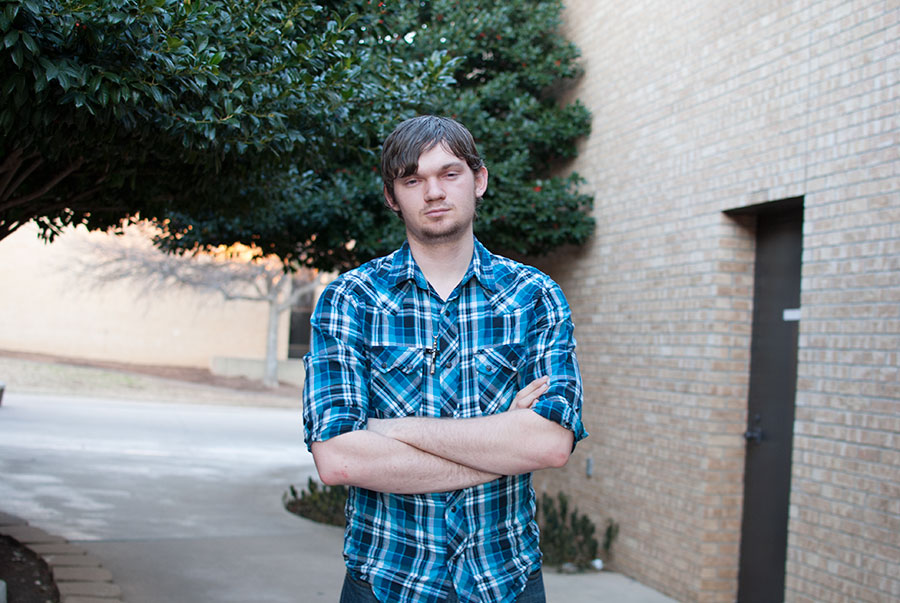By Rhiannon Saegert/nw news editor
As any professional actor can tell you, auditions can be nerve-wracking. Any student who wants to audition for a role in a TCC production, however, shouldn’t have to be afraid.
Auditions are open to everyone, regardless of major or experience-level, and the directors are always interested in what newcomers can bring to the table.
For example, about a third of the cast of the NE Campus fall production The Lieutenant of Inishmore were not drama students.
Evan Fladager, who studies computer programming on South Campus, said he went to the audition with a friend on a whim and landed a major part.
“I’d never even seen him before,” drama instructor Julie Gale said. “I’m very surprised this is his first play. He’s already grown so much as an actor.”
Fladager has never had a theater class.
“I’ve never actually done anything in theater, ever,” he said. “I don’t even think I went to any of the plays in my high school.”
Fladager said he thinks everyone should give theater a try.
“What’s the worst that could happen?” he said. “You don’t lose anything if you don’t get a part, and if you do get a part, you have the opportunity to be part of something that’s a lot of fun.”
Candace Chapman from NE started out in a theater appreciation class. She had taken drama in middle school and high school but had no intention of pursuing an acting career. After her lead role in Inishmore, she switched her major to acting.
“I didn’t think I was going to do it in college, but then I met Stephen Thomas [NE theater program coordinator], and I was like, ‘What the heck. I’ll take Theater I and see how it goes,’” she said. “He helped a lot and gave me the confidence I needed. I think everybody should try it just because it’s so much fun.”
Gale said that happens frequently.
“People come up, and they’ll audition, and they see they enjoy it, and they just continue with it,” she said. “We’ve had people who didn’t know they were going to major in theater. And then after being in a show, they really embraced it.”
Most auditions consist of cold readings and improvisation. Gale suggested reading the script in advance, if possible, to make stronger choices during the audition.
“Be friendly, be available and take risks,” she said. “My big advice I give to everyone is to make strong choices. If you’re going to fail, fail brilliantly.”
Donald Horn from South Campus says he had no acting experience before taking Theater I to earn a fine arts credit. Since then, he’s been in four productions. He says he’s found friends in the theater program.
“I would say that theater has the most family-like atmosphere I’ve ever witnessed in a scholastic environment,” he said.
For someone who’s new to theater and wants to audition, Horn said the best thing to do is “something absurd or unusual, especially if you’re not prepared. They look for dedication more than skill.”
Tommy Cook, also from South, said he “knew nothing about show business” when he was cast in his first show.
“[Instructor] Lindy [Benton-Muller] worked with me a lot because she knew I’d never done it,” he said.
Cook said the more experienced actors in the cast were also helpful.
“I got a lot from them,” he said. “They gave me a lot of tips. They were good teachers.”
After four productions, Cook said he can now do the same for new actors.
“That gave me the chance to teach somebody else, to help them along,” he said. “What you learn, you can turn around and share with someone else.”
Benton-Muller said she has found some excellent actors from her Theater Appreciation class.
Any student not enrolled in a theater class who becomes a cast or crew member for a TCC show on any campus must enroll in a course called Theater Practicum. This allows a student to get academic credit for their time and effort.
“You’re a student actor, not a community actor,” Benton-Muller said.
Musicals are the exception to this rule. Only students enrolled in the Musical Theater course are allowed to participate in musicals.
The required one-hour course is for the actors’ benefit and protection, Benton-Muller said.
“Back in the old days, shows weren’t worth credit. We just did them,” she said. “Now at least you get credit for it. That’s the nature of theater. It’s time-consuming.”
Benton-Muller believes many students are distinctly “disconnected” from TCC, mentally and emotionally. They come to their classes and go straight home without developing any sense of community.
She said she strives to create “a campus home, a family place of belonging where they’re respected for who they are. It can change people’s lives.
“Show up! Really. Don’t un-cast yourself. Don’t second-guess. Just show up.”























